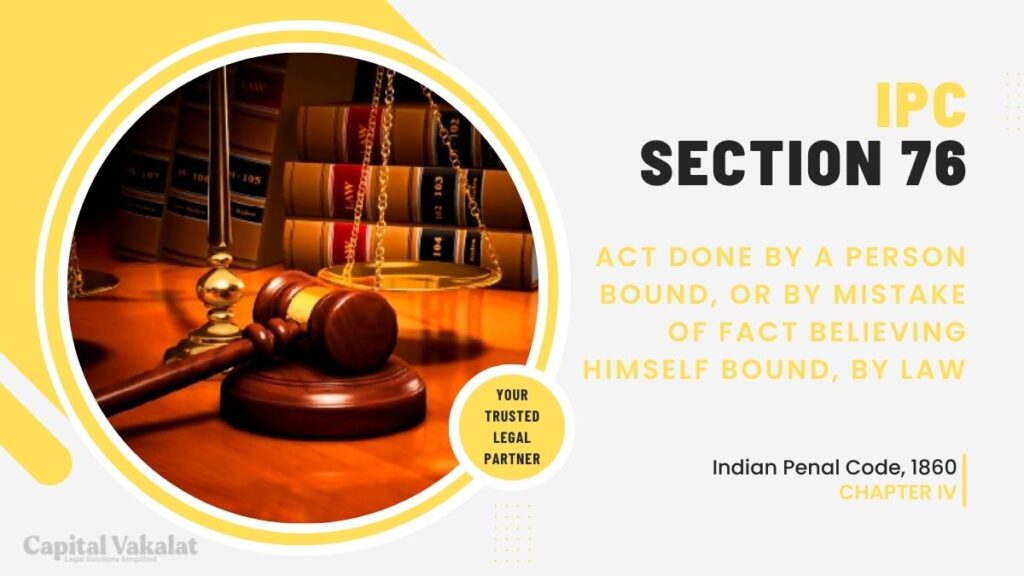In the realm of legal intricacies, Section 76 of the Indian Penal Code (IPC) stands as a pivotal provision that addresses acts performed by individuals who genuinely believe they are bound by law.

This article delves into the nuances of Section 76 IPC, shedding light on its interpretation, implications, and real-world scenarios.
Unveiling the Basics of Section 76 IPC
Introduction to Section 76 IPC
Section 76 of the IPC, often dubbed as the “Act done by a person bound, or by mistake of fact believing himself bound, by law,” serves as a unique legal provision. It primarily deals with situations where individuals carry out certain actions believing them to be legally mandated, even if they are not.
The Core Principle
At its core, Section 76 IPC hinges on the principle of ‘bona fide’ or good faith. It offers protection to individuals who act under the honest belief that they are legally obligated to perform a particular action.
Elements of Section 76 IPC
To better understand this provision, let’s break down its essential elements:
- Act Done by a Person: Section 76 applies to actions undertaken by individuals.
- Bound by Law: The person must believe that they are legally bound to perform the action.
- Mistake of Fact: This provision also covers cases where individuals commit an act based on a genuine mistake of fact.
- Belief in Legal Obligation: The individual must genuinely believe that their actions are in accordance with the law.
Real-Life Applications of Section 76 IPC
Case Studies
To illustrate the practical implications of Section 76 IPC, we can examine a few real-life cases:
Case 1 – The Good Samaritan
Imagine a person witnessing a road accident. Believing that they are legally obligated to help the injured, they provide immediate assistance. Section 76 IPC would protect this individual, as their actions were driven by a genuine belief in a legal obligation.
Case 2 – Misinformed Taxpayer
Suppose a taxpayer, due to misinformation, pays a higher tax amount than required. Even though the tax calculation was incorrect, the individual believed it was their legal duty to pay that amount. Section 76 IPC could be invoked to safeguard their actions.
The Interplay with Legal Principles
Section 76 IPC vs. Mistake of Law
It is crucial to distinguish between a mistake of law and a mistake of fact. While Section 76 IPC covers acts performed under a genuine mistake of fact, mistakes of law are generally not considered a valid defense.
Section 76 IPC and Other Legal Defenses
Section 76 IPC can complement other legal defenses, such as self-defense or necessity. It offers an additional layer of protection to individuals acting in good faith.
Conclusion
In a legal landscape where actions are often scrutinized, Section 76 IPC provides a safeguard for those who genuinely believe in their legal obligations. This provision, rooted in the principle of good faith, ensures that individuals acting under the belief of legal duty are protected from legal repercussions.
Section 76 IPC serves as a vital legal provision that protects individuals who act in good faith, believing in their legal obligations. It adds depth to the legal landscape by acknowledging the complexities of human actions driven by genuine beliefs in the eyes of the law.
FAQs
What happens if someone falsely claims they believed in a legal obligation to avoid liability?
False claims of belief in legal obligation can lead to legal consequences, including perjury charges. Section 76 IPC requires a genuine belief to apply.
Are there any limitations to invoking Section 76 IPC?
Section 76 IPC is not a blanket defense. It depends on the specific circumstances and the sincerity of the belief in legal obligation.
Does Section 76 IPC apply to criminal actions only?
No, Section 76 IPC can apply to both criminal and civil actions where a genuine belief in legal obligation exists.
How can one prove the genuine belief required by Section 76 IPC?
Proving a genuine belief often relies on evidence and circumstances surrounding the action. Consultation with legal experts is advisable in such cases.